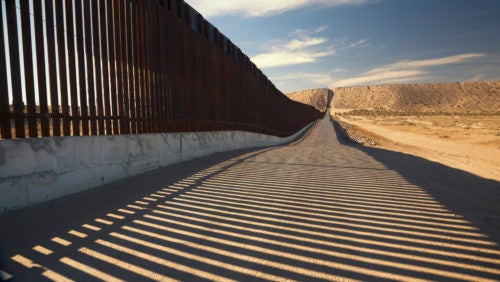National Security Law Society Hosts “Emergency at the Border?”
March 6, 2019

Two weeks after President Donald Trump declared a national emergency at the U.S.-Mexico border — and one week before a Senate vote on the matter — Mary McCord (L’90) of Georgetown Law’s Institute for Constitutional Advocacy and Protection teamed up with other experts to explore the legal issues.
Two weeks after President Donald Trump declared a national emergency at the U.S.-Mexico border — and one week before a Senate vote on the matter — Mary McCord (L’90) of Georgetown Law’s Institute for Constitutional Advocacy and Protection teamed up with other experts to explore the legal issues.
Visiting Professor McCord, Lawfare’s Scott Anderson and Penn Law’s Mark Nevitt participated in the March 4 event, hosted by the National Security Law Society student group and its 3L representative, Brenna Gautam (L’19). Topics covered included funding; historical precedents for military action at the border; eminent domain issues for U.S. landowners; and requirements of the National Emergencies Act.
“In his accompanying speech in the Rose Garden, Trump argued that past presidents had relied on the [statutory] authority for far less important things and predicted that while he may get sued…’ he will win at the Supreme Court,” said Gautam, who moderated the event. “Several activist groups and states have since filed lawsuits in an attempt to challenge this executive action, and the national emergency declaration has been criticized as an attempt to get around the congressional appropriations process.”
Anderson provided an overview of legal authorities being relied upon to build the wall; Penn Law’s Nevitt discussed topics including historical precedents for U.S. military at the border.
“The funds that were actually appropriated for the wall as part of the final appropriations compromise…[are] not really disputed,” Anderson said, noting that the Administration is also relying on Treasury forfeiture funds, and laws relating to the military and the National Emergencies Act.
As to which of the latter are the most problematic, it’s a hard call, he said, noting that the National Emergencies Act does not lay out substantive definitions of a national emergency. “It doesn’t say a national emergency has to be a war, it doesn’t say it has to be a threat to lives…instead, it establishes procedural protections that are supposed to allow Congress to fight back[.]”
Eminent Domain?
Georgetown Law’s McCord focused on eminent domain issues involving the approximately 100 landowners whose property will be affected by the proposed wall. In Texas, because of a river, the planned wall has to be built up to a mile inland from the border.
“This proposed wall will be built in such a way that it cuts off actual U.S. privately owned property on the south side of the wall…which means that for the government to build the wall there, they have to seize the property, either by the consent of the owners or by using the constitutional power of eminent domain…” McCord said. “We’re talking about people who will actually be cut off physically by a wall from the rest of the United States.”
As reported in the Washington Post in February, a 170-year-old Roman Catholic chapel is affected. McCord, the Senior Litigator from Practice at Georgetown Law’s Institute for Constitutional Advocacy and Protection, is litigating on behalf of the diocese. “People don’t realize how many people would be cut off,” she said.
While parts of existing walls have built in gates, with codes, for those who live on the south side, this can cause havoc in emergency situations like fires. “[If] you call 911,” McCord said, “guess who doesn’t have the code to open the gate?…[It’s] a very bad situation for property owners on the border.”
When it comes to eminent domain, those who can’t or don’t want to employ a lawyer are typically affected the most, she asserted. “Many people without resources agree to the money that the government [offers]…and the people down the road a few miles, who hired big law firms…got more money from the government or are still in litigation. We already have a really unjust situation.”